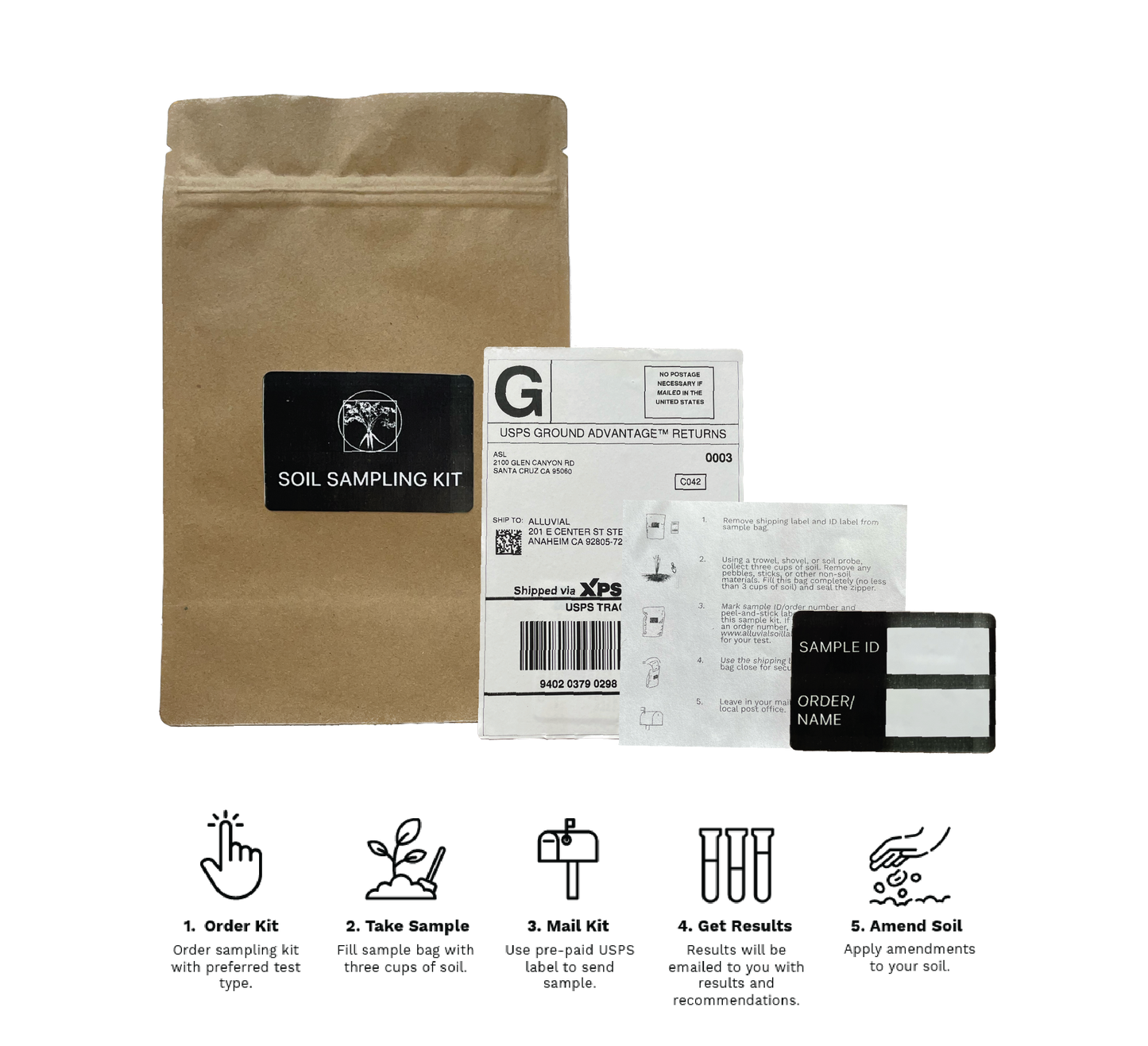Vineyard Soil Health Test
Vineyard Soil Health Test
The Vineyard Soil Health Test serves as a vital tool for evaluating soil fertility and suitability specifically tailored to the needs of wine grape cultivation. This comprehensive analysis delves into various critical parameters that impact both plant growth and soil sustainability, offering invaluable insights to cultivate the ideal soil conditions.
Couldn't load pickup availability
- Fast Turnaround Time
- Accurate Results
- Secure PCI/SSL Payment
Report includes:
- Graphs, data analysis, and personalized recommendations with organic or conventional amendments.
- A 15-minute phone consultation with one of our soil scientists.
Nutrient Analysis:
- NPK and Secondary Nutrients: This segment scrutinizes the levels of essential nutrients such as nitrate, phosphorus, potassium, magnesium, and calcium, all of which are pivotal for ensuring robust plant health.
- Micronutrients (Zinc, Manganese, Iron, Copper, Boron): By evaluating the availability of micronutrients crucial for various physiological processes within the plant, this assessment ensures holistic nutritional support.
- Sulfur: The determination of sulfur levels is imperative as sulfur plays a vital role in amino acid and protein synthesis, thus directly impacting plant vitality.
Soil Composition and Structure:
- Organic Matter: Measuring the presence of organic matter is vital for enhancing soil structure, promoting water retention, and facilitating nutrient accessibility.
- pH and Buffer Index: This analysis evaluates soil acidity or alkalinity and its resistance to pH fluctuations, a factor crucial for efficient nutrient uptake by the plants.
- Cation Exchange Capacity (CEC) and Percent Saturation of Cations: These measurements gauge the soil's capacity to retain and exchange nutrients, ensuring optimal nutrient availability for sustained plant growth.
- Soluble Salts, Sodium, and Excess Lime: The assessment of potential issues related to soil salinity, sodium levels, and excess lime is crucial for identifying and addressing factors that may impede plant health.
Physical Properties:
- Texture: By determining soil texture based on the proportions of sand, silt, and clay, this aspect influences critical factors such as water retention, drainage, and nutrient availability, all of which are pivotal for vineyard success.
Soil's Impact on Vine Growth and Terroir
The type and fertility of soil play a pivotal role in shaping vine growth and influencing the unique characteristics of terroir, thereby profoundly impacting the quality and flavor profile of wine grapes.
Soil Type:
Different soil types, such as loam, clay, sand, and combinations thereof, impart distinct attributes to vineyards. Each soil type possesses unique physical and chemical properties that directly influence vine growth and grape development.
- Loamy soils, characterized by a balanced mixture of sand, silt, and clay, often provide excellent drainage while retaining essential moisture and nutrients. Vines grown in loamy soils typically exhibit vigorous growth and produce grapes with well-balanced flavors.
- Clay soils, with their fine particles and high water retention capacity, can lead to slower drainage, potentially causing waterlogging and root suffocation if not managed properly. However, clay soils often contribute to wines with intense flavors and pronounced structure.
- Sandy soils, known for their excellent drainage but lower nutrient retention, can result in vines with less vigor and lower yields. However, grapes grown in sandy soils may showcase bright fruit flavors and elegant characteristics.
Fertility:
The fertility of soil, determined by its nutrient content and organic matter levels, profoundly impacts vine health and grape quality. Adequate fertility ensures the availability of essential nutrients for optimal vine growth and fruit development.
- Nutrient-rich soils support vigorous vine growth and abundant grape production, contributing to wines with depth and complexity.
- Conversely, nutrient-deficient soils may result in stunted growth, reduced yields, and grapes lacking in flavor and character.
Impact on Terroir:
Terroir encompasses the unique combination of environmental factors, including soil, climate, topography, and human intervention, that impart distinctive characteristics to wines from a particular region.
- Soil type and fertility are fundamental components of terroir, contributing to the flavor, aroma, and structure of wines.
- Vines grown in soils with specific mineral compositions may absorb and express these minerals in the grapes, adding complexity and nuance to the wine's flavor profile.
- Additionally, soil fertility influences vine vigor, canopy development, and grape ripening patterns, all of which contribute to the overall expression of terroir in the final wine.
Understanding the interplay between soil type, fertility, and terroir is essential for vineyard management and wine production. By carefully assessing and managing soil conditions, viticulturists can optimize vine growth, enhance grape quality, and craft wines that authentically reflect the unique terroir of their vineyard site.
Sampling instructions
Sampling instructions
1. Using a clean bucket and a shovel, collect three samples to a depth of 6 inches in random spots in the defined area*. Avoid sampling when soil is very wet.
2. Break up any clods of soil, remove rocks, stones, sticks and plant matter, and thoroughly homogenize soil together in the bucket.
3. Take out 3 cups of soil and place into plastic bag and label with a sample ID (i.e., Stevie's front yard), type of test, and order number (found in order confirmation email).
4. Purchase your test on our website and send sample to Alluvial Soil Lab, 201 E Center St, Ste 112 #3083, Anaheim, CA 92805 using any postal carrier of your choice.
Turnaround time is between 4 and 8 business days. Results will be sent via email.
*To ensure a comprehensive soil assessment in your land, it's recommended to take one composite soil sample for every 1,000 square feet of garden space. This composite sample is created by collecting smaller soil samples from different locations within the 1,000 square feet area, allowing for a representative analysis of the soil's characteristics.
**Always wear gloves, mask, or other necessary PPE while collecting samples from potentially contaminated soils.
Advanced details
Advanced details
Test includes:
1. Organic Matter, Nitrate, Phosphorus, Potassium, Magnesium, Calcium, pH, Buffer Index, Cation Exchange Capacity, Percent Saturation of Cations, Sodium, and Excess Lime, Sulfur, Zinc, Manganese, Iron, Copper, Boron.
2. Texture
3. Recommendations
Suitability list includes up to (12) suitable varieties


-

Wilson H.
Verified Purchase ✓
I recently started a garden at a community plot, and wanted to know what was in my soil, so I could make more targeted amendments. Jake walked me through how to do so, and after sending my samples in... (read more)
-

Noah M.
Verified Purchase ✓
As a professional in the field I very much appreciate the timely and detailed report, along with skilled follow up communications. I will certainly use Alluvial Soil Lab's services again.
-

Zakary S.
Verified Purchase ✓
Great support and detailed report. Helped advise what options we had to plant trees! Plants are doing incredible!(read more)
-

Peggy C.
Verified Purchase ✓
I recently moved to a property with a vineyard, and wanted to know what type of fertilizers to use and how much to apply. So I did a soil test. I was new to soil testing and with Jake's help and instructions, I was able to successfully collect… (read more)



